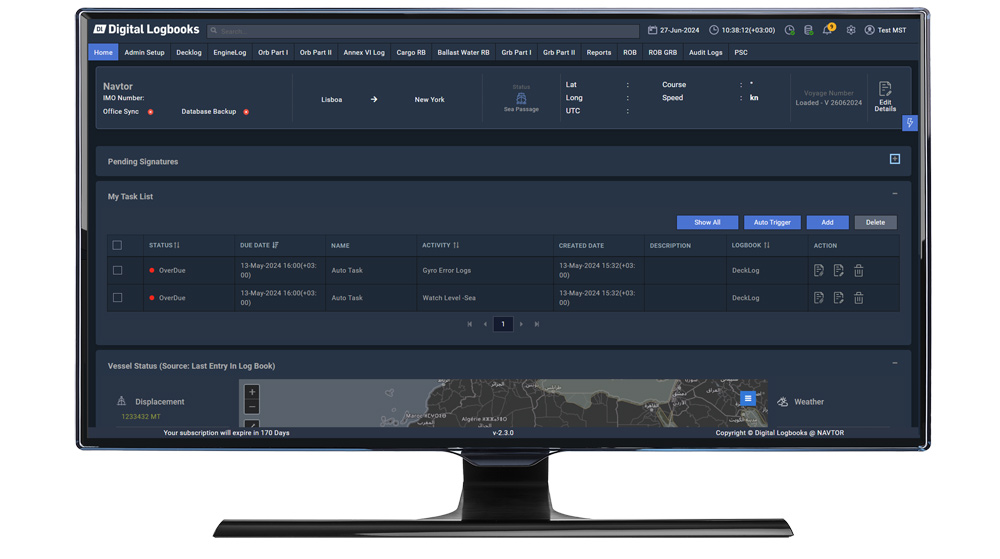
Say goodbye to scribbled handwriting, disjointed data sources and a huge administrative burden, and hello to simple mobile solutions. NAVTOR continues its drive to “make life easy” for vessel crews, management teams and shipowners with the next generation of digital logbooks. Amitabh Sankranti, Shipping Analytics Director at NAVTOR, explains.
Logbooks. One word with a million associations; and most of them far from positive.
Essential tools for compliance, treasure troves of data, these volumes are rapidly turning into relics from another age of shipping, with the majority of vessel crews still writing into paper books, or inputting into basic spreadsheets, that stand isolated, unloved and underused. Open to human error, difficult to share or validate, and majorly admin intensive (and therefore inefficient), surely there’s a better way to do things in the era of ‘smart shipping’?
Well, what if you could just use your mobile phone? Or tablet or laptop? What if all those countless logbooks were brought together on a single digital platform, securely sharing data, auto-filling fields (so crews could do more essential tasks), and mirrored to onshore offices for better operational insights, analysis and empowered decision making? And did I mention complete compliance?
I’d like to say, ‘welcome to the future’, but it’s really ‘welcome to the now’.
This is a reality today. And, as you can probably tell, it is transformational.
The power of possibility
Since forming in 2011 NAVTOR has been on a mission to make life easy for the shipping industry, developing digital innovations that take the strain off crews, while delivering powerful business benefits for shipping companies. As you can appreciate, logbooks have been a preoccupation of ours.
We now offer a comprehensive range of connected, customisable and compliant (with extensive Class and Flag approval) logbooks that are intuitive, configurable to all individual requirements, and easy – both to use and to extract value from.
They offer: real-time checklists; the ability to gather data from sensors, GPS and navigation sources for automated inputs; instant reports (ensuring easy compliance and charter agreement transparency); and one standardised, validated source of high quality data. And all of this is enabled and supported by NAVTOR’s secure digital ecosystem, currently supplying and servings our products and solutions to over 18,000 vessels in the world fleet.
What’s more, it’s mobile.
Setting new standards
You don’t need me to tell you that mobile devices are a cornerstone of modern society. They are integral to life on land, and offer huge potential on vessels, especially when it comes to digitising traditional tasks.
As such we see mobile availability as a major step forward for logbooks.
Instead of noting entries down manually – which, remember, often has to be done in environmentally or operationally challenging conditions (the perfect breeding ground for input omissions and errors) – crew members can simply use their phone. With a free, secure and intuitive app now available on both Android and iOS stores, they can make inputs, complete checklists and create tasks, reminding watchkeepers about which logs to prioritise.
A real breakthrough innovation is provided with the ability to dictate inputs, with crew members simply speaking to the logbook to input necessary data. This is a game changing simplification of administration for crewmembers, especially when working in difficult conditions under stress.
It is the epitome of our drive to make life easy for our industry, setting a new standard that, we believe, will eventually become the norm.
Simply better
Digital logbooks, however, are themselves not the norm just yet.
But that will change.
From a regulatory perspective, the IMO enabled the use of electronic logs in October 2020, on a voluntary basis, with many of the most forward-thinking owners moving to assess and adopt them in the years that have followed. We saw the same introduction process with ENCs and ECDIS, as an initial enablement and understanding then opened a pathway to a final mandate. When looking at the development of the industry, the pressures on stakeholders and the benefits of transitioning from paper to pixels, we see absolutely no reason why logbooks won’t follow the same route. And soon.
But even if they’re not mandatory yet, they’re simply a better way of doing things. They save time, effort and money. They are accurate, reliable and simplify compliance. They are easy to use, reducing training costs, and streamlining auditing. They enable live tracking of vessel tasks and operations, empower better (and proactive) decision making, and build trust through complete transparency.
And you can empower all this with a phone.
Logbooks don’t have to relics. They can be the foundations for smarter, more compliant and sustainable fleet wide operations. They can be the future.
We believe it’s time for everybody to log on…
To find out more about NAVTOR’s digital logbooks, and the NavStation mobile app, please see https://www.navtor.com/digital-logbooks

















